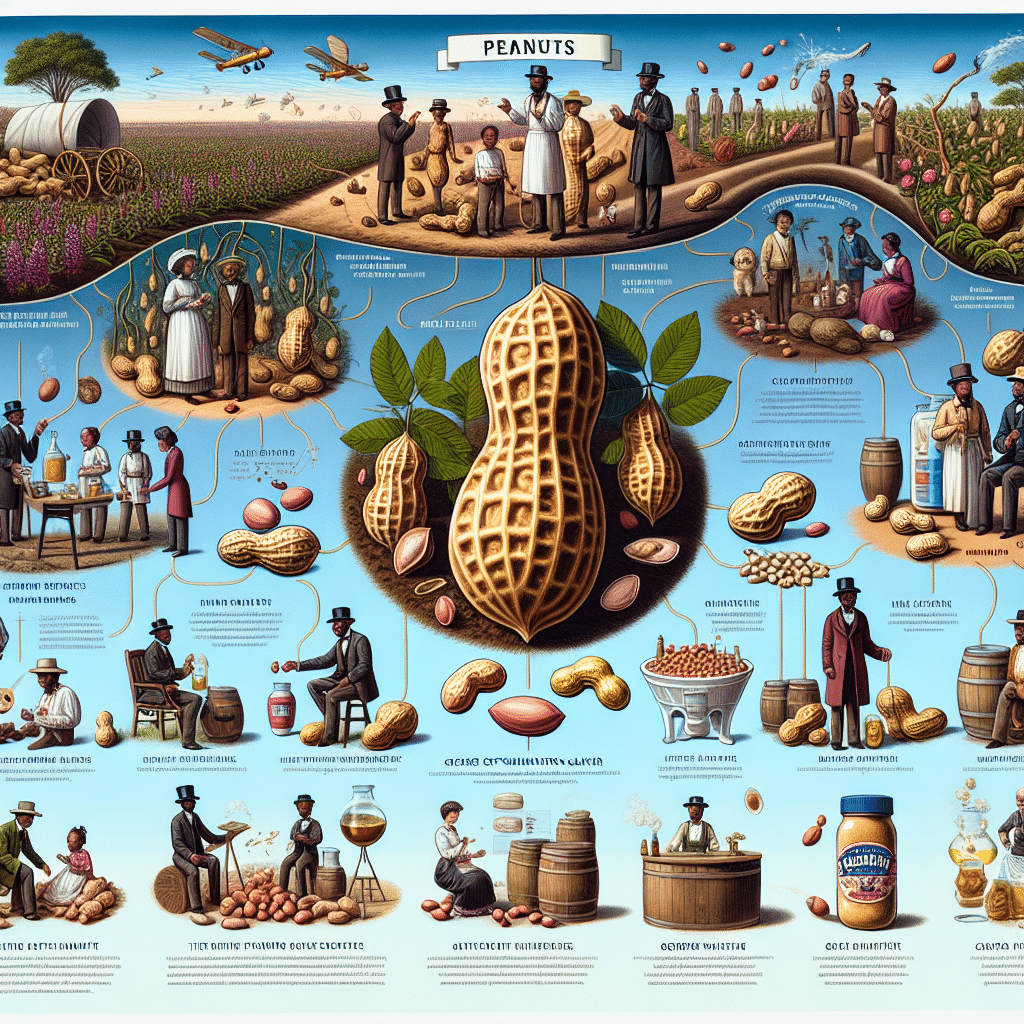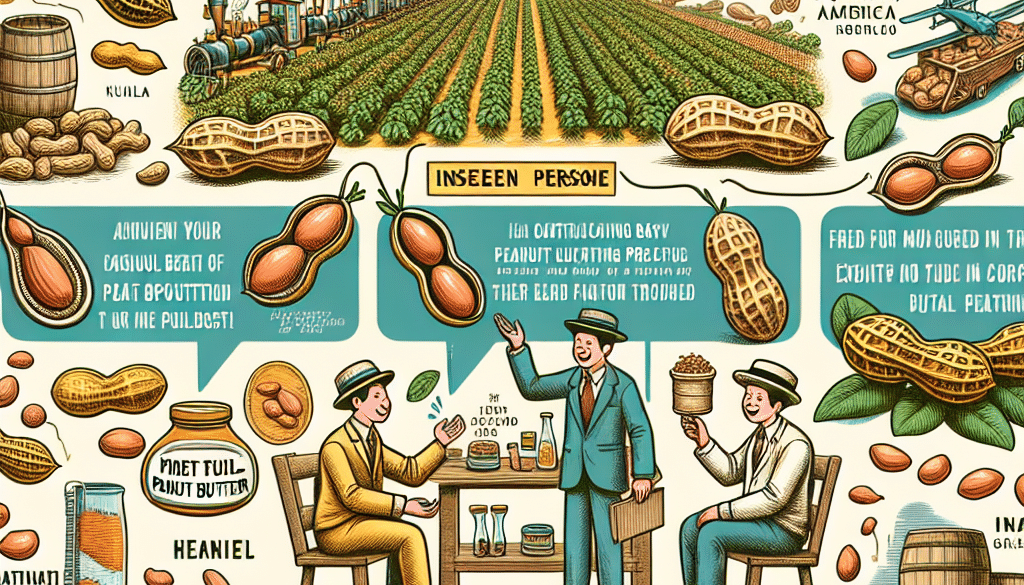The History of Peanuts: A Nutty Journey Unearthed
-
Table of Contents
The History of Peanuts: A Nutty Journey Unearthed

The humble peanut, often tucked away in lunchboxes or enjoyed at ball games, has a rich and storied past that spans continents and cultures. This nutty journey through history reveals the peanut’s transformation from a wild plant to a global culinary staple and industrial powerhouse. Let’s unearth the fascinating tale of the peanut and its rise to prominence.
Origins and Early Cultivation
The peanut, or Arachis hypogaea, is believed to have originated in South America, with archaeological evidence suggesting that ancient cultures in modern-day Bolivia and Peru cultivated peanuts as far back as 7,500 years ago. These early peanuts were likely quite different from the ones we consume today, as centuries of selective breeding have significantly altered their size, shape, and yield.
- Pre-Columbian societies valued peanuts for their nutritional content and versatility.
- They were used in rituals and as offerings to the gods.
- Peanuts were also traded extensively, spreading throughout the Americas before European contact.
Spread Across the Globe
With the arrival of Spanish and Portuguese explorers in the New World, peanuts began their global journey. The explorers brought peanuts back to Europe, and from there, they spread to Africa and Asia through trade routes and colonial expansion.
- In Africa, peanuts adapted well to the climate and became a staple crop, especially in West Africa.
- European traders then brought peanuts to North America in the 1700s, where they were initially used primarily as animal feed.
- By the 1800s, peanuts had become popular in the southern United States for their soil-enriching properties and as a food source.
The Rise of Peanuts in America
The Civil War played a significant role in popularizing peanuts in the United States. As food supplies dwindled, soldiers on both sides turned to peanuts as a high-protein sustenance that was easy to transport and store. After the war, peanuts remained a popular snack, and their cultivation spread throughout the southern states.
- Technological advancements in the late 19th and early 20th centuries, such as mechanical harvesters, helped increase peanut production.
- The work of agricultural scientist George Washington Carver was pivotal in promoting peanuts as a valuable crop for soil health and for his development of over 300 uses for peanuts, including as a key ingredient in numerous products.
- Peanut butter, invented in the late 1800s, became a household staple by the early 20th century, further cementing the peanut’s place in American culture.
Industrial and Commercial Expansion
As demand for peanuts grew, so did the need for efficient production and processing methods. The peanut industry rapidly expanded, with advancements in cultivation, harvesting, and shelling. By the mid-20th century, peanuts had become a significant agricultural commodity, with uses ranging from food products to oil and livestock feed.
- The development of peanut oil provided a high-smoke-point cooking oil that was also used in the production of soaps and cosmetics.
- Peanut-based snacks, such as roasted peanuts and peanut candies, became popular treats worldwide.
- The rise of health-conscious consumers in the late 20th century saw peanuts being marketed as a source of protein and healthy fats.
Modern Cultivation and Challenges
Today, peanuts are grown in tropical and subtropical regions around the world, with China, India, and the United States being the top producers. Modern cultivation practices focus on sustainability, pest management, and genetic improvement to meet the growing demand for peanuts and peanut products.
- Advances in biotechnology have led to more disease-resistant and high-yielding peanut varieties.
- Integrated pest management practices help reduce the use of chemical pesticides, promoting environmental health.
- However, challenges such as climate change, water scarcity, and market fluctuations continue to impact peanut cultivation and pricing.
Conclusion: The Enduring Legacy of Peanuts
The history of peanuts is a testament to human ingenuity and adaptability. From its origins in South America to its global spread, the peanut has proven to be more than just a snack. It has played a role in agriculture, industry, and nutrition, becoming an integral part of diets and economies around the world. As we continue to enjoy peanuts in various forms, we also recognize the ongoing efforts to sustainably produce and innovate with this remarkable legume.
Discover ETprotein’s Nutritious Protein Products
For those interested in incorporating high-quality protein into their diets, ETprotein offers a range of organic and plant-based protein products. Their selection includes peanut protein, which carries the rich history and nutritional benefits of peanuts into a convenient and versatile form. Whether you’re looking to enhance your culinary creations or boost your nutritional intake, ETprotein’s products are an excellent choice.
About ETprotein:
ETprotein, a reputable protein Chinese factory manufacturer and supplier, is renowned for producing, stocking, exporting, and delivering the highest quality organic bulk vegan protein and plant proteins. They include Organic rice protein, clear rice protein, pea protein, clear pea protein, pumpkin seed protein, sunflower seed protein, mung bean protein, peanut protein etc. Their offerings, characterized by a neutral taste, non-GMO, allergen-free attributes, cater to a diverse range of industries. They serve nutraceutical, pharmaceutical, cosmeceutical, veterinary, as well as food and beverage finished product distributors, traders, and manufacturers across Europe, USA, Canada, Australia, Thailand, Japan, Korea, Brazil, and Chile, among others.
ETprotein specialization includes exporting and delivering tailor-made protein powder and finished nutritional supplements. Their extensive product range covers sectors like Food and Beverage, Sports Nutrition, Weight Management, Dietary Supplements, Health and Wellness Products, and Infant Formula, ensuring comprehensive solutions to meet all your protein needs.
As a trusted company by leading global food and beverage brands and Fortune 500 companies, ETprotein reinforces China’s reputation in the global arena. For more information or to sample their products, please contact them and email sales(at)ETprotein.com today.














